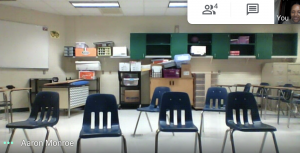
How the 6th-grade students set the “stage” for the Homecoming Dance as they did their own improv version of the scene.
On our third week working with the 6th-grade students, Group 4 was super happy with the way things went! Diego had the idea to make our script-writing process run more smoothly: an improv game! We had, on our own screens, the list of plot points from Act 4 and we asked them, scene by scene, to act out what a particular plot point might look like (i.e. Claudia accusing Hero at the Homecoming dance). We didn’t use the names of the characters in an effort to not be too confusing. We just did general plot points (in that case, someone accused another person of something really big at the Homecoming Dance). The title quote of this post was shared by a student named Joy and comes from the scene where Bea is telling Ben how mad she is about the accusations made against Hero.
This was such a fun exercise and I think the students really enjoyed it. I think it also helped that we had a teacher this time who was pretty good at helping them stay focused and also because one of us had the idea to split the group into partners, so we had two students doing the “acting” while the other (there was only one other at this time) was drawing. Our plan now is to put the quotes/lines altogether into a script and share it with them so that we can figure out what pictures we need/when we can record.